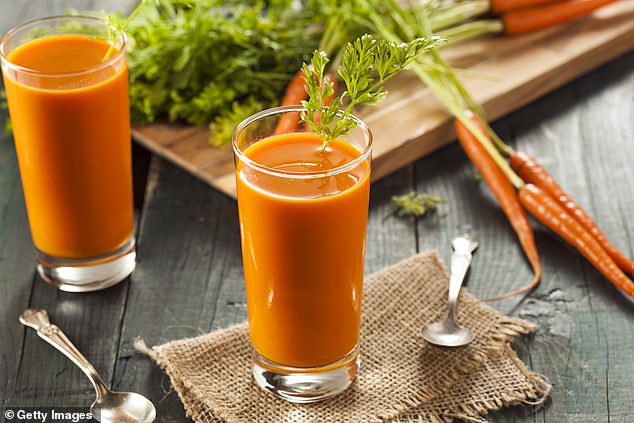I’ve tried many ridiculous techniques in the pursuit of beauty.
Washing my hair with Stella Artois for more defined curls? Tick. Covering myself in turmeric for brighter skin? Tick. Munching raw garlic cloves to cure acne? Er… tick.
And my most recent experiment? Eating ten carrots a day in order to achieve the perfect tan.
Welcome to the wonderful world of ‘carrot maxxing’.
For decades, mums have implored their children to eat their carrots by citing the old wives’ tale that eating enough of them would help you see in the dark.
Now a new generation of TikTok wellness obsessives are extolling the health benefits of this ‘miracle’ vegetable, claiming that eating enough carrots will give you a natural tan and balance excess oestrogen in the female body, helping with premenstrual syndrome (PMS) and even preventing weight gain. And, as a fake tan devotee, my interest is always piqued by novel ways to look bronzed.
Carrot-maxxers preach that beta-carotene – the compound that gives carrots, cantaloupe melons, squashes and sweet potatoes their hue – can, if eaten in sufficient quantity, tint the skin. For once, this is a beauty fad that’s backed up by science – though strictly speaking, you’ll turn a light shade of orange rather than golden brown.
Also, the colour tends to concentrate in the palms of your hands and soles of your feet, an unflattering look that makes it seem as if you’ve forgotten to wash your hands after dousing yourself in cheap fake tan.

Olivia Dean’s most recent experiment was eating ten carrots a day to achieve the perfect tan

A new generation of TikTok wellness obsessives – including influencer Isabelle, above – are extolling the health benefits of this ‘miracle’ vegetable
This carrot-tan, known as ‘carotenemia’, occurs when you eat between 20 and 50 milligrams of beta-carotene per day. This works out at approximately ten large carrots – no mean feat.
Most influencers achieve this by blitzing their carrots into juices. Others make grated carrot salads, which they delicately munch throughout the day.
Not being in possession of a juicer – nor the patience to grate ten carrots – I bought 2kg and dutifully munched through them raw over the course of a weekend.
Did it work? Of course not. All I was left with was a resounding hatred of crudites.
In order to actually achieve carotenemia, you need to be much more committed, spending at least three weeks eating approximately ten carrots a day – and even then it’s not guaranteed.
Before and after pictures posted by influencers show a negligible difference in skin tone. Plus, vitamin A is fat-soluble, meaning that to actually absorb the nutrients required to turn orange, you’d need to eat the carrots alongside a spoonful of oil. No thanks.
While eating an excess of carrots is unlikely to cause you any real harm – overdosing on vitamin A can lead to organ damage, but the amount of carrots you’d need to consume to reach this point would be prohibitive – we should all be more mindful about taking ‘wellness’ advice from people on the internet, says specialist dietitian Nichola Ludlam-Raine, author of How Not To Eat Ultra-Processed.
‘Social media trends can be entertaining, but health advice should come from qualified professionals,’ she warns. ‘It’s always worth pausing to ask: who’s giving this advice, and what evidence supports it?’

Most influencers achieve the desired effects by blitzing their carrots into juices
But what of the carrot’s ‘hormone-balancing qualities’?
Excess oestrogen in the body, known as hypoestrogenism, is a genuine condition. But widely applicable symptoms such as bad PMS, weight gain around the hips and stomach, and fatigue mean that anyone can diagnose themselves with it – and stuffing themselves with carrots isn’t going to alleviate their problems.
Nichola points out that ‘hormone balancing’, while a catchy term, is massively oversimplified. ‘There’s no solid evidence that carrots can directly influence hormones in a meaningful way,’ she warns. ‘Our hormones are regulated by complex systems in the body, and are not something that can be ‘balanced’ by eating specific foods. A healthy balanced diet, stress management, adequate sleep and physical activity can all support hormonal health, but there’s no one food that can provide a quick fix.’
Gut health is another trending online obsession, and it seems that the link between carrots and oestrogen balancing has been twisted through this lens. Eating any raw, organic vegetable is beneficial for your gut health, as the fibre has positive prebiotic effects which, in turn, can support normal oestrogen levels.
But carrots are no better than any other vegetable at doing this – and if you have them in juice form, you lose the fibre anyway.
The TikTok-ification of our health has been of increasing concern. ‘I’ve noticed an increase in people coming to my clinic with nutrition concerns driven by online trends,’ says Nichola.
‘While social media can help raise awareness of health issues, it’s also fuelled a rise in self-diagnosing and following unqualified advice, which can be misleading and harmful. Misinformation spreads like wildfire.’ That being said, Nichola stresses that carrots’ vitamin A content makes them ‘great for eye health’.
Perhaps we’re best sticking with the old wives’ tales after all.